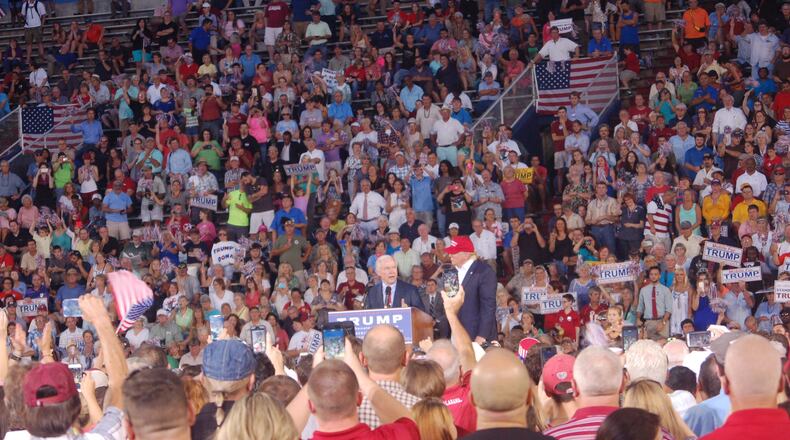Establishment Republicans seem to be coalescing around the idea that the best way to cut the legs from under Donald Trump is to point out that on a number of issues, he directly contradicts longtime Republican dogma. "He's not one of us, he's one of them," in other words.
The approach has at least three things going for it:
First, it's somewhat true. Trump has argued that in a country as prosperous as the United States, there's no reason to reduce entitlements such as Social Security, Medicare and Medicaid. He thinks wealthy Americans, hedge fund managers and corporations can afford to pay more in taxes; he doesn't think Americans should have to forego needed medical treatment just because they can't afford insurance. Unlike the official GOP, he is deeply skeptical about the benefits of free trade, and he believes that the current campaign-finance system, with its reliance on huge donations by 0.001 percent of the population, is an invitation to corruption. Those policy positions do indeed align him more with the Democrats than with Republicans.
Second, the Republican base typically shows no patience with those who deviate from the party orthodoxy. In a party in which labels such as "moderate" and "RINO" can be career-enders, Republican leaders have legitimate grounds to hope that by exposing Trump as a heretic they can gut him.
Third, they have no real alternative. Given the mood of the GOP electorate, attacking Trump because he has become "too Republican" on issues such as immigration is a strategy for disaster. Their best bet is to attack him where he can be accused of not being Republican enough.
The strategy does make one dangerous assumption, however: It assumes that the Republican base really and truly believes that entitlements need to be cut, that the wealthy pay too much in taxes, that money is speech, etc. But what if a substantial portion of the base really DOESN'T believe those things? What if they have merely accepted those positions as tribal markers, so to speak -- part of the accepted definition of what it means to be Republican -- but without any real emotional commitment?
Put another way, what if those positions on largely economic issues have been imposed by the party elite as part of the GOP's outreach to the business sector, and as consistent with the ideology of party intellectuals? What if the support for those positions among GOP voters is paper thin?
For example, party strategists and consultants, as well as the Washington establishment, strongly defend the concept that money is speech and that campaign donations ought to remain unregulated. As Mitt Romney put it, "corporations are people too!" Their stance isn't surprising -- the situation gives the Republican Party a financial advantage, and much of the party elite is getting rich off the influx of huge amounts of money into the system.
But in the new Iowa poll by the Des Moines Register, 91 percent of Iowa Republicans say they're unsatisfied (51%) or mad as hell (40%) with the amount of money in politics. Just 7 percent say they are satisfied with the current system. Given that, I'm not sure that defending the rights of billionaires to spend freely on candidates -- even Republican candidates -- is the right issue to stress.
Likewise, in a national Pew poll taken last year, 59 percent of self-described conservatives said they opposed any cuts in Social Security benefits, just as Trump does, and in a Gallup poll this year, 42 percent of conservatives agreed that wealth should be more evenly distributed. In a YouGov poll, Republicans were far more antagonistic to free-trade agreements than Democrats, even though the GOP leadership strongly supports them.
In short, on the economic issues that divide Trump from the Republican establishment, Trump is usually closer to the base than are the elite.
Ross Douthat, the conservative columnist for The New York Times, sees those same stresses at work within the party. He writes:
"In a healthy two-party system, the GOP would treat Trump's strange success as evidence that the party's basic orientation may need to change substantially, so that it looks less like a tool of moneyed interests and more like a vehicle for middle American discontent.
In an unhealthy system, the kind I suspect we inhabit, the Republicans will find a way to crush Trump without adapting to his message. In which case the pressure the Donald has tapped will continue to build — and when it bursts, the GOP as we know it may go with it."
Tis a conundrum.
About the Author
Keep Reading
The Latest
Featured


